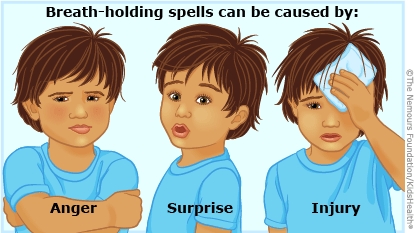A breath-holding spell is when a baby or child holds their breath, usually after being angry, frustrated, surprised, or in pain. Sometimes the breath-holding leads to the child passing out. It can be scary to watch a breath-holding spell, but they aren't harmful. Kids outgrow them by around 8 years old, and often earlier. Here's what to do if your child has a breath-holding spell.


There are two types of breath-holding spells:
Both types of spells can make kids pass out for up to a minute. In the most extreme cases, kids might have seizures. Having a seizure does not cause any long-term harm or put a child at risk for a seizure disorder.
If your child has a breath-holding spell:
After the breath-holding spell:

Your child:


What causes breath-holding spells? The exact cause is not known. They usually happen when the child is having very strong feelings, but kids don't have the spells on purpose. It's just how their brain and body respond to strong feelings. Sometimes, anemia might cause them.
Can breath-holding spells be prevented? If your child has anemia, treating the anemia may help make the breath-holding spells happen less often.
If there is a specific trigger, trying to avoid it can help. For example, if your child's breath-holding spells usually happen when they get very upset, try to help them not get too tired or hungry and to find ways to calm down, such as deep breathing or playing with a favorite toy. It can be hard to find a balance between disciplining your child and trying to prevent breath-holding spells. Talk to your health care provider if you need help with calm ways to discipline your child.